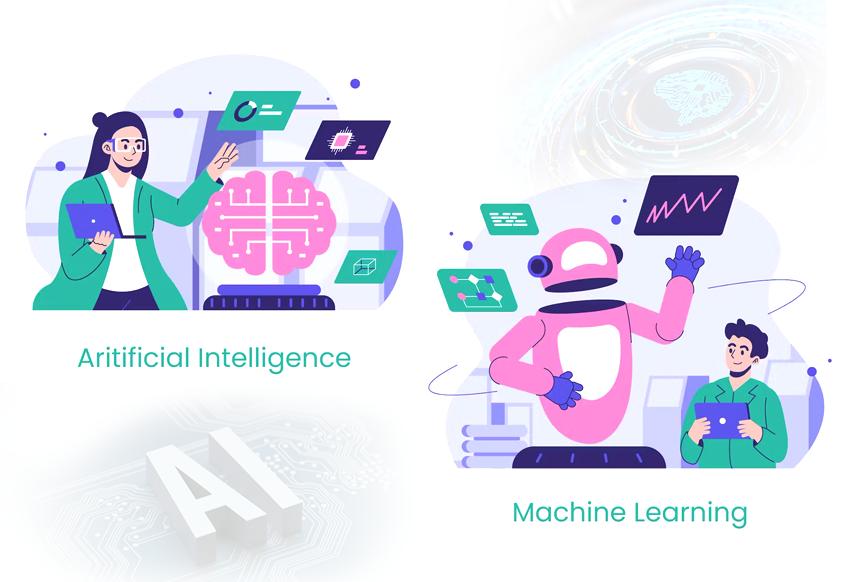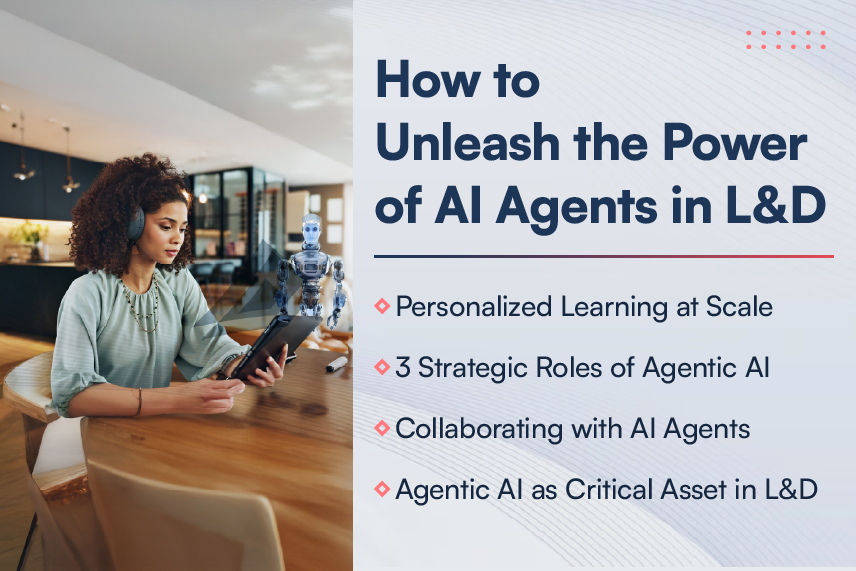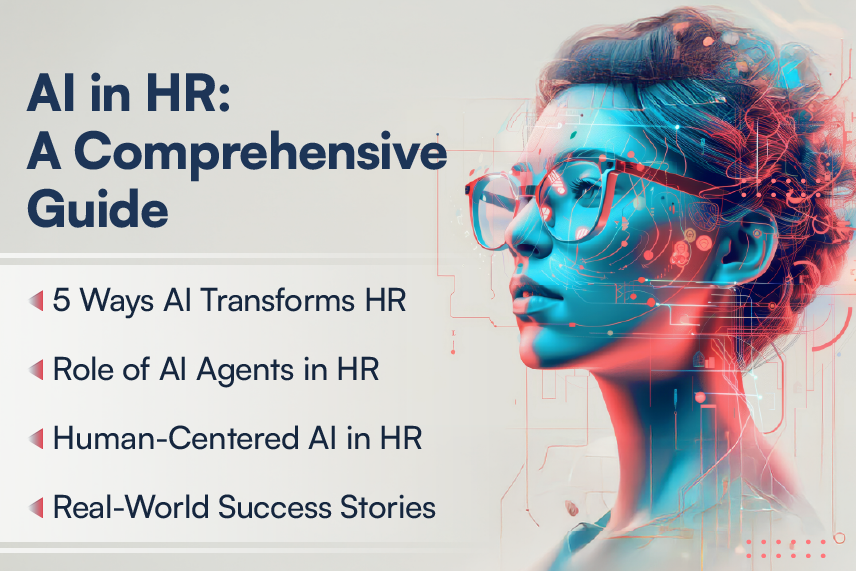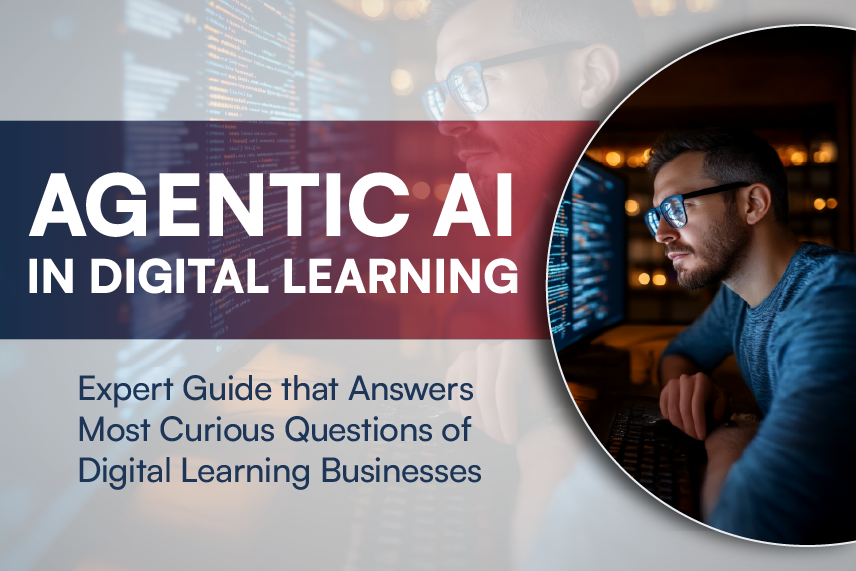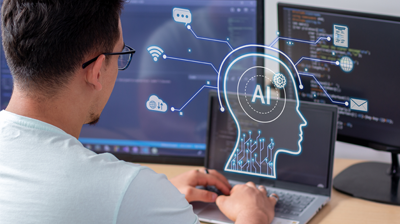
There is a lot of curiosity around how AI will transform eLearning. AI in eLearning stands as a game-changer, promising to revolutionize how organizations impart knowledge and foster skill development.
As AI is making waves across the eLearning industry, organizations are keen on understanding how AI will transform eLearning further in the future. To give a glimpse into this transformation, AI in eLearning will facilitate personalized learning experiences for learners with different learning styles.
The use of AI in eLearning will not replace humans, but certainly improve the learning and teaching outcomes and ultimately help drive business results. The benefit of improved outcomes and support with the use of AI can also be seen outside the eLearning industry.
We are already experiencing how AI is impacting our everyday life. You may ask, “How?” Well, the application of AI can be seen the moment sensing lights turn on when you enter an unoccupied conference room or a parking area. Cars with an automatic parking feature have already been rolled out.
Furthermore, intelligent sensors in cameras can detect a smile and help take good pictures. AI-powered voice assistants like Alexa can switch on the lights in the living room and Google Assistant can add items to a shopping list for you. Besides, you may have used AI personal assistants or apps on your smartphone.
All these instances show how AI is already part of our life and even impacting it. So now the million-dollar question is how AI will transform eLearning.
Applications of AI in eLearning
The buzz around ‘AI in eLearning’ has gained a lot of weight in recent times. AI is a primary topic of discussion at most learning and technology conferences, among L&D groups, and organizations in general. AI has certainly taken center stage in eLearning. Many renowned eLearning speakers and experts are increasingly talking about the impact of AI on the current eLearning scenario.
Here are some interesting trends and insights that shed light on how AI will transform eLearning:
1. Chatbot
Chatbots have become synonymous with AI in eLearning. Chatbots in eLearning has many benefits, including:
- Optimizing eLearning development
- Adapting eLearning to the learner’s needs
- Providing learners with personal assistance
- Enabling self-paced learning
- Increasing learner engagement with powerful conversational interfaces
Chatbots in eLearning have stolen the show by being one of the most discussed AI applications in the industry. They can be an effective solution to connect learners with the resources and job aids they need, and when they need them. Furthermore, chatbots in eLearning offer a way to easily create and deploy interactive and adaptive learning sequences in learning engagements.
Organizations need to explore ways to incorporate chatbots in eLearning projects. For example, chatbots can introduce a course and deliver pre-work, give embedded performance feedback during the course, and share personalized tips after the course.
Harbinger developed an AI-based voice-enabled chatbot to enable smart eLearning experience for the floating staff of one of the largest hot dog chains in the U.S.
2. AI and Instructional Design
Apart from how AI will transform eLearning, AI and its effect on instructional design is yet another highly discussed topic after chatbot. AI has taken instructional design to the next level. Even acclaimed instructional design experts agree that AI has made a transformative impact on instructional design.
Instructional design needs to evolve as new technologies and approaches emerge. Instructional designers should be prepared for where instructional design may be heading to, especially when AI is predicted to dominate the future of learning.
Having said that, the fear of AI replacing humans in the learning workforce is unwarranted. It’s important to note that the role of instructional designers has evolved with the emergence of AI in the learning ecosystem.
Want to learn how to integrate Generative AI in eLearning? Start strategizing eLearning development the Generative AI way.
How AI Will Transform eLearning in 7 Ways
Let’s look at how AI is changing the eLearning game for learners and organizations in different ways.
1. Adaptive Learning
AI algorithms can analyze the learner’s performance data and adapt the learning experience accordingly. By tracking individual progress, AI systems can identify knowledge gaps and provide personalized recommendations and resources to fill those gaps. Adaptive learning systems can adjust the difficulty level of content, pacing, and learning materials to suit the needs of each learner.
2. Intelligent Tutoring Systems
AI-powered tutoring systems can simulate human tutors by providing personalized feedback, answering questions, and guiding learners through various learning tasks. These systems use machine learning and natural language processing (NLP) techniques to understand the learner’s queries and provide accurate responses. Intelligent tutoring systems can offer 24/7 support, enabling learners to access help whenever they need it.
3. Automated Grading and Feedback
AI algorithms can automate the grading process for objective assessments, such as multiple-choice questions. This helps instructors save time and provide faster feedback to learners. Additionally, AI can analyze and provide feedback on subjective assignments by assessing grammar, coherence, and content quality. While AI is not perfect in grading subjective assignments, it can assist instructors by identifying potential areas for improvement.
4. Content Recommendation
The use of AI in eLearning can analyze learner behavior, preferences, and performance data to recommend relevant learning resources, courses, and materials. By leveraging machine learning techniques, eLearning platforms can provide personalized content suggestions, ensuring learners receive materials that match their interests and learning goals.

5. Natural Language Processing
NLP allows AI systems to understand and process human language. In eLearning, NLP can be used to develop chatbots and virtual assistants that interact with learners, answer their questions, and guide them through the learning process. NLP also enables the analysis of large amounts of text-based learning materials, extracting key concepts and creating summaries or providing contextual information.
6. Data Analysis and Learning Analytics
The use of AI in eLearning can help analyze vast amounts of data generated by learners to identify patterns, trends, and insights. Learning analytics can help instructors and organizations monitor the progress of learners, identify at-risk learners, and make data-informed decisions to improve the effectiveness of instruction strategies and course design.
7. Automated Content Creation
AI can assist in generating learning content, including quizzes, assessments, and even course materials. By leveraging natural language generation and machine learning algorithms, AI can automate the process of creating educational content, saving time for instructors, and enabling the creation of personalized learning materials.
As AI continues to advance, it will further revolutionize the way we learn, making learning more accessible, personalized, and effective. However, it’s important to note that while AI can enhance the learning experience, it cannot replace the role of human instructors and trainers who provide guidance, mentorship, and a deeper understanding of the subject matter.
How AI Will Transform eLearning: Outlook
There is so much to ponder on when it comes to AI in eLearning. As AI is slowly becoming mission-critical for businesses in various ways, it is important to pay close attention to how AI will transform eLearning to drive business outcomes.
Apart from the above points, here’s how AI could impress.
eLearning powered by AI can differentiate the learner’s learning speed and suggest different paths of learning depending on their current level of mastery. The key to building successful learning experiences lies in asking the right questions. AI-powered platforms can be used to create questions, assessments, and quizzes with greater speed and efficiency.
The overarching objective of AI is to develop technology that enables computers and machines to operate intelligently. In the realm of eLearning, AI has already proven itself to be as impactful as anticipated.
The future holds great promise for AI in eLearning, making it inevitable for businesses to continue their exploration into understanding how AI will transform eLearning. Embracing this transformative journey is crucial for staying ahead in leveraging the full potential of AI to revolutionize the landscape of eLearning.
To explore more on how AI will transform eLearning, contact our experts at contact@harbingergroup.com.


